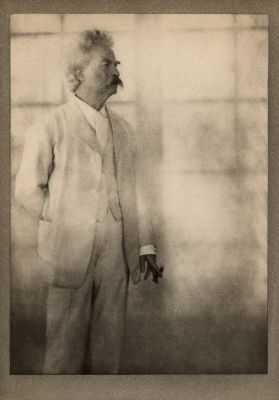
Title
A Tree in Greyfriars Churchyard, EdinburghArtist
Coburn, Alvin Langdon (American, 1882-1966)Key FigureDate
1909 ca. plate (1904 negative)Process
PhotogravureAtelier
Alvin Langdon CoburnImage Size
19 x 15.8 cm
Coburn always maintained that his Edinburgh photographs were his best, so it is not surprising that the maquette he produced, probably in 1909, for an eventual book, contained a mix of waxed platinum prints from his September 1904 trip and later gelatin silver prints from his 1907 and October 1909 visits. He planned for Edinburgh to be published in 1910 directly after London. He wrote to Stieglitz:
I have a new book of the “fine” town [Edinburgh] up to date. Of course, some of those old prints like “the Wier’s (sic) Close” [1904] I will never be able to improve on but there are others which looked at in the light of more recent work did not live. The twenty plates (gravures) that I am now busy at will I think in their way hold their own with my best work and the book will be a fitting companion album to the London. Of course there is no end to the things there are to do.
Two weeks later, Coburn was working on his New York book, and Edinburgh was not mentioned again. One surmises a publisher’s intervention, choosing New York rather than Edinburgh as a more commercial publication. Even so, Coburn was telling the Buffalo Express in December 1910 that he had two more projects completed. “Edinburgh is finished, so is Ireland.” The latter also never saw the light of day.
Of the twenty-four prints mounted in the maquette, eighteen remain, but six have been removed, possibly to be sent to Rupert Hart-Davis, the publisher of Coburn’s eventual Edinburgh book in 1954. [1]
The subject of this rare photogravure is Greyfriars Churchyard a place made legendary in the history of photography by Hill and Adamson who used it as a set for many of their early artistic studies.
References
[1] Foster, Sheila J. Imagining Paradise: The Richard and Ronay Menschel Library at George Eastman House, Rochester. Rochester, NY: George Eastman House, 2007. p. 229











